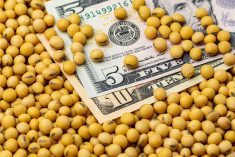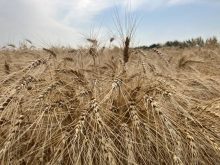Chicago | Reuters — U.S. grain and soybean futures fell sharply on Tuesday after the U.S. Department of Agriculture (USDA) boosted key crop supply forecasts and scaled back some demand expectations in a monthly report.
Benchmark corn, soy and wheat futures all retreated back to pre-Ukraine war levels as soaring costs since Russia’s invasion and broader economic concerns dented demand.
USDA’s supply-and-demand data heaped further pressure on grain values already weighed down by slumping outside market influences, including sharply lower energy prices and a stronger U.S. dollar.
Read Also

Carney wins admiration globally but struggles to lower food costs at home
Prime Minister Mark Carney has earned global admiration for openly declaring the end of a global order based on rules, but he has had far less success addressing a growing and more day-to-day concern at home: the rising cost of food.
USDA reduced its U.S. corn demand view for the current season on Tuesday and raised its forecast for domestic corn production. It also cut its forecast for the country’s soybean harvest.
The bearish data overshadowed lingering concerns about crop-stressing heat and dryness across the U.S. Midwest.
“They’re putting weather and supply issues on the back burner. The USDA helped feed that demand-led break to the downside,” said Mike Zuzolo, president of Global Commodity Analytics.
“The trade was looking for demand destruction, and they got it,” he said.
Chicago Board of Trade December corn dropped 42-1/2 cents, to $5.86-1/2 per bushel, while November soybeans fell 62 cents, to $13.43 per bushel. CBOT September wheat fell 42-1/4 cents, to $8.14-1/4 a bushel.
Earlier weakness was fuelled by a fresh 20-year high for the dollar, which makes commodities priced in the currency costlier, and on forecasts suggesting some rain for the U.S. Midwest this week.
Wheat added to losses from Monday on news about talks between Ukraine, Russia, Turkey and the United Nations over Ukraine’s war-disrupted grain exports.
Grain markets also digested USDA’s weekly crop conditions report late on Monday, which showed lower-than-expected ratings for corn and soybeans.
However, weather forecasts pointing to showers in part of the Midwest this week tempered concern about stress to pollinating corn.
— Reporting for Reuters by Karl Plume in Chicago; additional reporting by Christopher Walljasper in Chicago, Gus Trompiz in Paris and Naveen Thukral in Singapore.
















